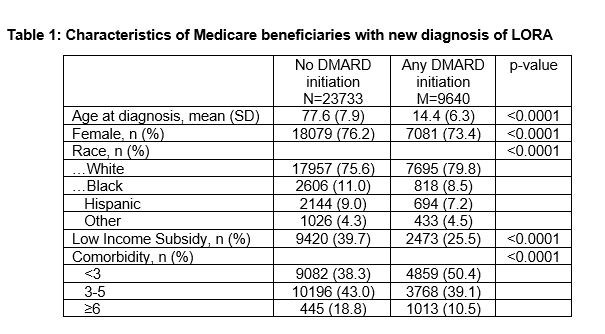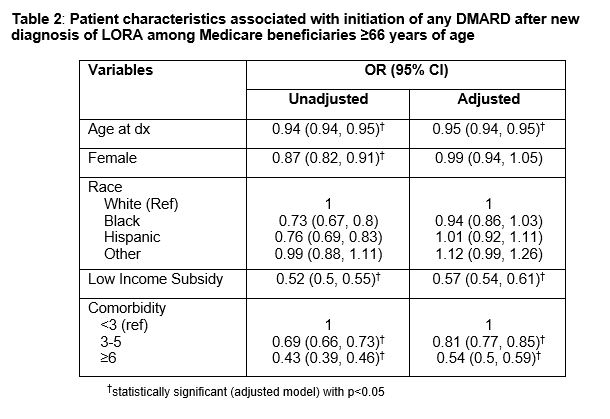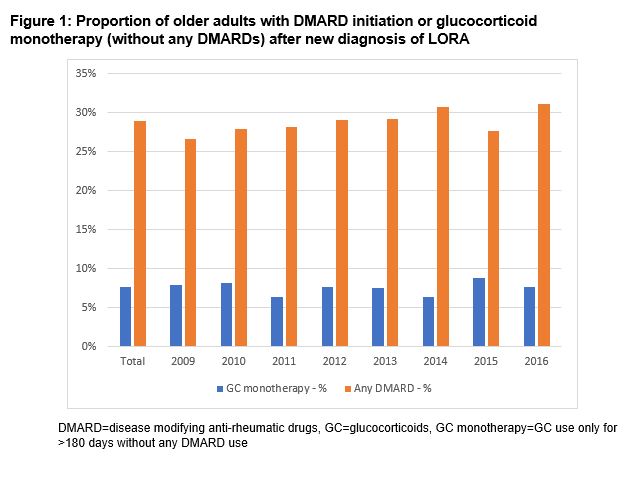Session Information
Session Type: Poster Session A
Session Time: 9:00AM-11:00AM
Background/Purpose: The number of older adults living with rheumatoid arthritis (RA) is growing as the world population is aging. Up to one-third of the older RA population are diagnosed after the age of 65 and have late-onset RA (LORA) which is characterized by more symptomatic and progressive disease. Older adults with RA are less likely to receive optimal treatment despite disease modifying anti-rheumatic drug (DMARD) being effective and generally well tolerated in older adults. In addition, they are prone to the negative effects of glucocorticoids (GCs) which are symptom relieving but not disease modifying. We evaluated the prevalence of and factors associated with disease modifying anti-rheumatic drug (DMARD) initiation and glucocorticoid (GC) use in older adults with new diagnosis of LORA.
Methods: In this retrospective observational study, we identified adults ≥66 years of age with new diagnosis of LORA using 20% Medicare data from 2008-2017. Information on baseline patient characteristics and DMARD initiation during the first 12 months after LORA diagnosis were collected. Concomitant long-term ( >90 days) GC use and GC monotherapy (GC use >180 days without any DMARD) was also evaluated. We performed multivariable logistic regression for factors associated with DMARD initiation.
Results: We identified 33,373 older adults with new diagnosis of LORA in continuous fee-for-service Medicare. Average age at LORA diagnosis was 76.7 (SD 7.6), 75.4% were female, 76.9% were non-Hispanic white, and 35.6% had low-income subsidy. Less than one third (28.9%) were initiated on some form of DMARD during the first 12 months after LORA diagnosis. The proportion of older adults initiated on DMARDs was stable between 2009-2015 and ranged between 26.7-30.8% (Figure 1). Among those on any DMARD treatment (N=9640), 90.1% were initiated csDMARD only, 2.6% on bDMARD only, and 6.8% on both classes of DMARDs. Concomitant long-term GC use was observed in 44.3% of older adults on DMARDs. Among those without DMARD use (N=23,733), 10.8% were on GC monotherapy alone. In multivariable analyses, DMARD initiation was associated with younger age, fewer comorbidities, absence of low-income subsidy status, adjusting for patient sex and race/ethnicity (Table 2).
Conclusion: DMARD use in older adults with new diagnosis of LORA is low despite current clinical practice guidelines recommending early aggressive initiation of treatment. Concomitant long-term GC use and GC monotherapy use among those on any DMARDs is common, raising concern for suboptimal DMARD use. Further studies are needed to understand drivers of DMARD use in older adults.
To cite this abstract in AMA style:
Lee J, Martindale J, Makris U, Singh N, Yung R, Bynum J. DMARD Initiation in Older Adults with New Diagnosis of Late-Onset Rheumatoid Arthritis [abstract]. Arthritis Rheumatol. 2023; 75 (suppl 9). https://acrabstracts.org/abstract/dmard-initiation-in-older-adults-with-new-diagnosis-of-late-onset-rheumatoid-arthritis/. Accessed .« Back to ACR Convergence 2023
ACR Meeting Abstracts - https://acrabstracts.org/abstract/dmard-initiation-in-older-adults-with-new-diagnosis-of-late-onset-rheumatoid-arthritis/



